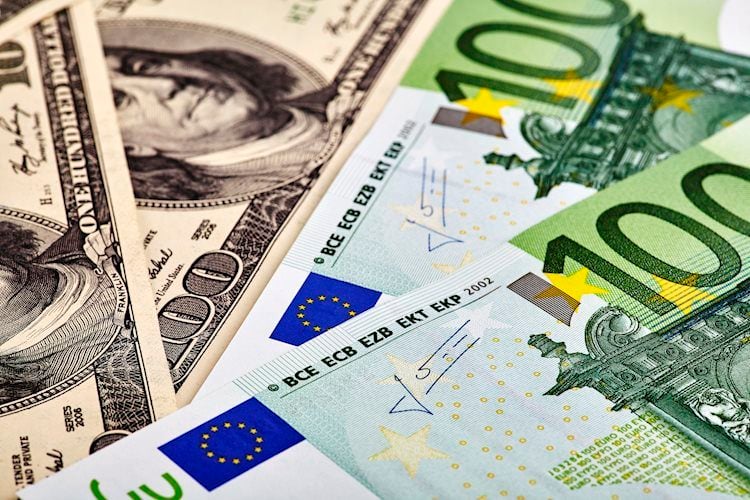- Euro meets daily support in the 1.0870/65 band vs. the US Dollar.
- Stocks in Europe reverse earlier losses on Friday.
- EUR/USD falters once again around the 1.0900 region.
- US jobs report takes centre stage later in the session.
- ECB’s Christine Lagarde speaks later in the day.
The Euro (EUR) struggled once again to breach the key 1.0900 resistance level against the U.S. Dollar (USD) on Friday, allowing the selloff in EUR/USD to resume amid overall caution in markets ahead of the upcoming U.S. jobs report.
The USD Index (DXY) index was mixed, while the Greenback’s recent strong rebound appears to be taking a breather at the end of the week.
Debate continues around the potential future moves by the Federal Reserve and European Central Bank (ECB) to normalize monetary policy, as concerns grow about slowing growth on both sides of the Atlantic.
Recent strong U.S. economic data, reflecting a tight labor market and resilient economy, has reinforced expectations the Fed will likely hike rates by a quarter point at its July meeting.
Back at the ECB, Vicepresident Luis De Guindos said that their job was not yet done and mentioned that while underlying price pressures continued to be strong, most indicators had started to display some signs of softening. He noted that services had become an important driver of inflation and emphasized that the evolution of core inflation would be crucial for future ECB policy decisions. De Guindos also pointed out that it was uncertain what would happen to rates in September.
In the domestic data space, Industrial Production in Germany contracted 0.2% MoM in May, while Retail Sales in Italy expanded 0.7% also in May vs. the previous month.
Across the Atlantic, consensus expects the US economy to have created 225K jobs in June and the Unemployment Rate to have eased to 3.6% in the same period.
Daily digest market movers: Euro bounces off daily lows ahead of Payrolls
- The EUR regains composure and approaches the 1.0900 zone.
- Germany’s Industrial Production surprised to the downside.
- US jobs report grabs all the attention on Friday (+225K exp.).
- Investors continue to price in a 25 bps hike by the Fed in July.
- ECB’s De Guidos said the September meeting remains an open question.
- ECB’s Lagarde speaks later in the session.
Technical Analysis: Euro sees its selling bias alleviated above 1.1012
The inability of EUR/USD to gather some convincing upside traction has prompted sellers to remain in control of the pair for the time being.
That said, the loss of the weekly low at 1.0833 (July 6) could open the door to a test of the interim 100-day SMA at 1.0826. The breakdown of the latter should meet the next contention area not before the May low of 1.0635 (May 31) ahead of the March low of 1.0516 (March 15) and the 2023 low of 1.0481 (January 6).
On the other hand, occasional bullish attempts should clear the 1.0900 region to expose a potential move to the June peak of 1.1012 (June 22) prior to the 2023 high of 1.1095 (April 26), which is closely followed by the round level of 1.1100. North from here emerges the weekly top of 1.1184 (March 31, 2022), which is supported by the 200-week SMA at 1.1180, just before another round level at 1.1200.
The constructive view of EUR/USD appears unchanged as long as the pair trades above the crucial 200-day SMA, today at 1.0618.
German economy FAQs
The German economy has a significant impact on the Euro due to its status as the largest economy within the Eurozone. Germany’s economic performance, its GDP, employment, and inflation, can greatly influence the overall stability and confidence in the Euro. As Germany’s economy strengthens, it can bolster the Euro’s value, while the opposite is true if it weakens. Overall, the German economy plays a crucial role in shaping the Euro’s strength and perception in global markets.
Germany is the largest economy in the Eurozone and therefore an influential actor in the region. During the Eurozone sovereign debt crisis in 2009-12, Germany was pivotal in setting up various stability funds to bail out debtor countries. It took a leadership role in the implementation of the ‘Fiscal Compact’ following the crisis – a set of more stringent rules to manage member states’ finances and punish ‘debt sinners’. Germany spearheaded a culture of ‘Financial Stability’ and the German economic model has been widely used as a blueprint for economic growth by fellow Eurozone members.
Bunds are bonds issued by the German government. Like all bonds they pay holders a regular interest payment, or coupon, followed by the full value of the loan, or principal, at maturity. Because Germany has the largest economy in the Eurozone, Bunds are used as a benchmark for other European government bonds. Long-term Bunds are viewed as a solid, risk-free investment as they are backed by the full faith and credit of the German nation. For this reason they are treated as a safe-haven by investors – gaining in value in times of crisis, whilst falling during periods of prosperity.
German Bund Yields measure the annual return an investor can expect from holding German government bonds, or Bunds. Like other bonds, Bunds pay holders interest at regular intervals, called the ‘coupon’, followed by the full value of the bond at maturity. Whilst the coupon is fixed, the Yield varies as it takes into account changes in the bond’s price, and it is therefore considered a more accurate reflection of return. A decline in the bund’s price raises the coupon as a percentage of the loan, resulting in a higher Yield and vice versa for a rise. This explains why Bund Yields move inversely to prices.
The Bundesbank is the central bank of Germany. It plays a key role in implementing monetary policy within Germany, and central banks in the region more broadly. Its goal is price stability, or keeping inflation low and predictable. It is responsible for ensuring the smooth operation of payment systems in Germany and participates in the oversight of financial institutions. The Bundesbank has a reputation for being conservative, prioritizing the fight against inflation over economic growth. It has been influential in the setup and policy of the European Central Bank (ECB).













